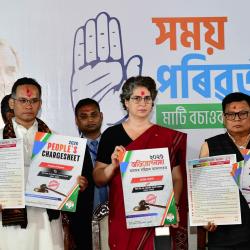Urgent measures for rhino conservation
Precious one-horned rhino is facing unprecedented threat to its existence, with as many as 49 Rhinos already dead in 2016 itself. State Forest Minister, Pramila Rani Brahma, had recently revealed these shocking numbers in a statement. According to the official records, 22 rhinos had dies in natural calamity like the recent floods while the rest were butchered by poachers.
Assam based Aaranyak, which had been working for the past 2 decades for rhino conservation in the state have submitted a set of recommendations for protection of rhinos and to urgently curb the growing cases of poaching of the species in the state. These were submitted at a workshop titled “NATIONAL LEVEL EXPERT CONSULTATION FOR DEVELOPING A STRONGER STRATEGY FOR PROTECTION OF RHINOS IN ASSAM”, organized by the Forest Department, Government of Assam in Guwahati on August 11, 2016, in collaboration with Assam Project on Forest and Biodiversity Conservation (APFBC) Society.
Some of the key recommendations from Aaranyak were:
1. To involve Village Defence Party in rhino protection.
2. To set up community based vigilance system using modern tools like GPS outside the park for monitoring of stray rhino movement, flood and intelligence gathering.
3. To prepare risk matrix for rhino bearing protected areas, e.g., how to protect rhino during flood, civil unrest etc.
4. To undertake perception studies, in order to find out knowledge and attitude of people towards rhino.
5. To prepare a stakeholders matrix for rhino bearing protected areas to educate local community on ecosystem services of protected areas and rhino conservation.
6. To involve RMSA/SSA for developing schools as resource centers around the protected areas.
7. To develop baseline data on socio-economic status of fringe villagers living adjacent to PAs.
8. To identify and address issues and problems of villagers at the fringe of rhino bearing protected areas
9. To provide training, resources, equipment, technical support and market linkage to members of community based institutions and individuals on different diversified livelihood and monitor over the time.
10. To make formation process of the Eco Development Committees (EDCs) more transparent.
11. To declare fringe villages around PAs as special development zone, where line departments like Agriculture, Veterinary etc. join hands and come forward to provide support towards community development. Unemployed youth should be trained under the Skill India Program.
Aaranyak has taken several measures to ensure effective rhino conservation in the state and outside. Some of the salient initiatives of Aaranyak towards rhino conservation includes, supporting wireless communication system in Kaziranga National Park for enhancing rhino protection, contributions towards strengthening anti-poaching infrastructure of the forest department, introducing for the first time in North East India, a K-9 Dog Squard for rhino anti-poaching operations, legal orientation programme for the forest officials working in the Wildlife Sanctuaries and National Parks in Assam in 1996, in order to increase the rate of conviction as part of anti-poaching efforts and awareness and training of law implementing authorities and initiatives for obtaining judiciary support. In addition, the organization is actively involved in development of expertise on translocation and reintroduction of rhinos, in house laboratory based optimization of DNA technology for forensic identification of individual rhinos from dung and other types of biological samples, being recognised by IUCN SSC Asian Rhino Specialist Group. The organization also carried out first ever successful genetic population size estimation of rhinos through dung DNA analysis at Garumara National Park of West Bengal. At present, the Ministry of Environment, Forests and Climate Change of Government of India is planning on developing a national level Rhino Horn DNA Indexing System, based on the technology that Aaranyak has developed through multi-year research. In addition, Aaranyak has carried out scientific investigations on the genetic threats to long term survival of rhinos in small populations, which has provided valuable inputs in planning population management of the species in Eastern India.
Other Contents by Author
The Golden langur (Trachypithecus geei) has now been listed in the World’s 25 Most Endangered Primates! It has been placed in this list due to extensive habitat fragmentation, habitat destruction and encroachment along its distribution range which has led to rapid population decline.This was declared in a sessionunder chairmanship of Dr. Russell A. Mittermeier (Chair,International Union for Conservation of Natures Species Survival Commission Primate specialist Group (IUCN,SSC, PSG) in the joint congress of International Primatological Society and American Society of Primatologist which was held at Chicago, USA from 21st to 27th August 2016. Dr. Dilip Chetry, Head of Primate Research and...
For the 10th time since 2008,important delegatesrepresentingthe Governments of Bhutan and Indiaalong with conservation NGOs of the region met in Guwahati, Assam.The landmark meeting was held on 21st-22nd June 2016 to discuss Conservation of Biodiversity- Issues and Opportunities in the large Transboundary Landscape between India and Bhutan across the International Boundary from the river Sankoshinthe west to the River Dhansiri in the east, referred to as the TransboundaryManas Conservation Area (TraMCA). In India, it includes the Manas Tiger Reserveandin Bhutan, the forested areas of south covering the Royal Manas National Park, Phipsoo Wildlife Sanctuary and Jomotshangkha...
Sunday is the World Environment Day and this year’s global theme “Zero tolerance for Illegal Wildlife Trade” found resonance in events observed across Assam, to mark the day.New recruits of Assam Police joined hands to learn about nature, to care for the environment and environmental issues through an awareness event organised by Aaranyak in collaboration with Assam chapter of Institutions of Engineers and 4th APBN authorities in Guwahati.A big number of recruits under training at 4th APBN along with officers of 4t APBN attended a plantation programme at 4th APBN campus followed by a meeting on this year's World Environment Day's global theme "Fight Against Illegal Trade in Wildlife"....
Assam’s rivers and wetlands which crisscross the state, may soon lose much needed protection under the Central Government’s new Draft Wetland Rules 2016. The Ministry of Environment and Forest, Government of India has recently released the Draft Wetlands (Conservation and Management) Rules 2016. To analyse the impact of these new Draft on wetlands of Assam, Aaranyak and ActionAid jointly organised a consultation at Guwahati today. The consultation compared the Wetland Rules 2010 with the Draft Wetland Rules 2016, and has found that the new Wetland Rules offers very few protective measures to Assam’s wetlands when compared to the Wetland Rules of 2010.The Consultation suggested a complete...
The Assam StateZoocum Botanical Garden has been recently struggling in many aspects which include availability of much needed field necessities, in a timely manner. The guards and animal keepers have to work in challenging conditions and the lack of basic amenities like proper shoes makes the task at hand more difficult. To provide some much needed relief to the staff of Assam State Zoo cum Botanical Garden, Guwahati based NGO Aaranyak distributed 178 pairs of shoes and boots in an event held on 16th May 2016 at the Herbarium Meeting Hall, Assam State Zoo cum Botanical Garden, Guwahati. The shoes which were sponsored by Aaranyak and Katie Adamson Conservation Fund (USA), in association...
For the first time ever, forest guards of Manas National Park, will patrol on motor bikes instead of on foot! The Tiger Conservation at Manas National Park has unfolded a new chapter recently. Extensive and intricate patrolling at the deep heart as well as porous border of Manas is possible now, with the newly introduced Motorbike Patrolling.“Earlier we patrolled on foot and could cover distances only as much our feet would allow. Now that we have motorbikes, we feel better equipped at detailed patrolling of the park”, says Forester MrinmoyHazarika, in a conversation with the Aaranyak team. While trainee Ansuma Brahma added, “We have patrolled 995 kilometres of the Bhuyanpara Range in just...
A group of wildlife photographers and biologists from North East India have reported discovering of a new species of primate to India, the White Cheeked Macaque, in Arunachal Pradesh!Arunachal Pradesh, lying in the Eastern Himalaya biodiversity hotspot, finds itself on the global map of latest discoveries, with the report of this new species of primate. The White-cheeked Macaque (Macaca leucogenys) was first spotted at the Anjaw district, lying in the Eastern corner Arunachal Pradesh. This astounding discovery has been made by a team of biologists and wildlife photographers comprising of Dr. Ranjan Kumar Das, Udayan Borthakur and Dr. Dilip Chetry. The team, accompanied by professional bird...
There is now a new ray of hope for tigers at Manas National Park, Assam. The first step towards conservation of an endangered species is a group of trained Forest Staff. The Manas Tiger Conservation Program (MTCP), launched by Aaranyak jointly with Panthera, Wildlife Conservation Trust of India, Awely of France and BTC Forest Department, promises to double the number of wild tigers at Manas in the coming decade. As an initial step towards this goal, a two week long Training Program on Basic Patrolling Techniques and Data Management for the Forest Staff of Manas National Park was held at the Bhuyanpara Range from 29th of February to 12th March, 2016. Sponsored by the Integrated Tiger...
An army is created to defend a cause, and when women form an army for a cause they believe in earnestly, nothing remains impossible. The women of Dadaravillage in Assam have been slowly but steadily leading a crusade under the leadership of Dr. Purnima Devi Barman for the conservation of the endangered Greater Adjutant Stork which is locally known as Hargila. The families of Dadara have adopted the rare stork as their own, and the species which was on the brink of extinction are slowly getting a new lease of life. 70 women of all ages have now come together to form an ‘Army’ ready to combat all obstacles in the path of Hargila conservation. Their sheer dedication and commitment have got a...
Can genetic research be used to protect wildlife? Aaranyak, a Scientific and Industrial Research Organisation based at Guwahati, has proven that the answer is a resounding ‘Yes’. After breaking new grounds in conservation efforts in Assam, Aaranyak has now reached out to neighbouring country Bhutan. Bhutan shares a common border with Assam along with a portion of the state’s Manas Tiger Reserve. In a bid to further strengthen conservation activities among both countries, 13 officers of Department of Forests and Park Services from Bhutan have participated in a special capacity building training on application of genetic techniques for wildlife population monitoring, in Guwahati, from 7th to...










Add new comment